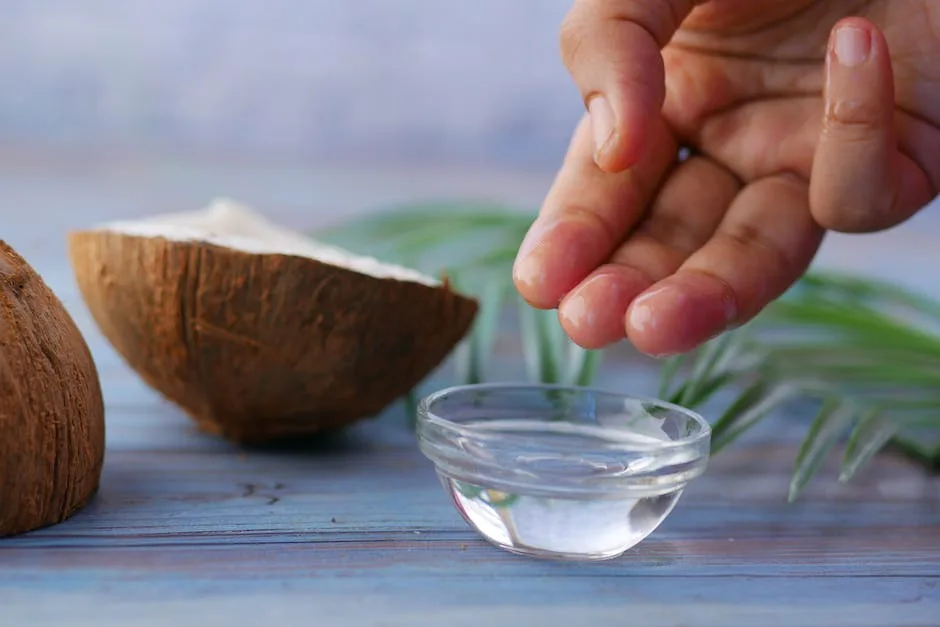Coconut oil is a type of oil that is derived from the meat of a coconut. It is a saturated fat, which means that it is solid at room temperature. Coconut oil can be melted in the microwave, but it will become liquid again once it cooled down.
You can melt coconut oil in the microwave, but it may not be the best method. You may find that it doesn’t melt evenly and can create hot spots. If you do decide to melt it in the microwave, be sure to do so in short bursts and stir often.
What happens if you microwave coconut oil?
The popping that happens when coconut oil is microwaved is that trapped water is being turned to steam and popping out excitedly. Perhaps you have experienced the same issue when melting butter in the microwave. Butter, an emulsion of fat and water, will do the same thing.
There are a few different ways that you can melt coconut oil, depending on what you need it for. If you are looking to melt a small amount, the microwave is the quickest and easiest way to do it. Simply put the jar of coconut oil in the microwave and heat it in short bursts until it is melted. If you need to melt a larger amount, you can do it on the stove over medium heat. Again, simply spoon the desired amount into a saucepan and heat it until it is melted. Whichever method you choose, be sure to stir the oil occasionally to help it melt evenly.
Is it safe to melt coconut oil
Coconut oil is a great choice for cooking because it has a high smoke point. This means that it is less likely to smoke and burn at high temperatures, making it ideal for almost all cooking methods. Additionally, coconut oil is safe to melt and solidify as many times as necessary, so you can use it over and over again without any worries.
Coconut oil is a healthy and delicious addition to many recipes. However, it can be a bit difficult to work with if it is in solid form. If you find that your coconut oil is solidifying at room temperature, you can melt it down by heating it in a pan or in the microwave. Once it is in liquid form, it will be much easier to cook with. Enjoy!
How long do I microwave coconut oil?
If you need to melt coconut oil for a recipe, it’s easy to do in the microwave. Just measure the approximate amount of oil that your recipe calls for, then place it in a microwave-safe container. Heat the oil in the microwave for 15 seconds at a time, stirring in between. Once it’s melted, let it cool and measure it exactly.
Polyunsaturated fats are the most fragile and are not recommended for cooking. Heat, along with light and oxygen, can destroy the beneficial fats in some oils.
Should coconut oil be refrigerated?
Coconut oil is a long-lasting, stable oil that does not need to be refrigerated. It can last up to two years in a pantry, as long as the lid is tightly sealed. Depending on the temperature, the oil may solidify or liquefy in the jar.
Coconut oil is unique for its high content of the saturated fat lauric acid, which makes up around 40% of its total fat content. This makes coconut oil highly resistant to oxidation at high heat. For this reason, it is very suitable for high-heat cooking methods like frying.
Will coconut oil go back to solid
Coconut oil is a versatile and healthy oil that can be used in many ways. It can take on two forms depending on temperature – liquid and solid. If you store it at room temperature it will be in its liquid consistency, and will solidify if stored in the fridge. Coconut oil is a healthy alternative to other oils and is great for cooking, baking, or using as a beauty product.
Fractionated coconut oil is made by melting coconut oil and then letting it cool very slowly. The different kinds of fats in the oil will separate based on their differing melting points. This is a physical separation process, no chemical reactions occur.
Is it safe to microwave oil?
While it could be safe to microwave small amounts of oil, you should not keep on warming at high temperatures. Keep in mind, the oil doesn’t warm up and energy is moved to the holder, which can explode because of the contrast in temperature, which is very dangerous.
– Coconut oil has a high fat concentration, which makes it ideal for cooking at high temperatures.
– However, for best results, we recommend keeping your burners at a medium heat when cooking with coconut oil. This will ensure that the oil doesn’t burn and ruin your dish.
Does microwaving coconut oil destroy nutrients
When microwaving or heating your coconut oil directly, it can potentially deplete its nutrients. Instead, use the “double boil” method to avoid this.
There are a lot of different oils out there, and it can be difficult to know which ones are healthy and which ones aren’t. Here are five of the healthiest cooking oils that you can choose from:
Olive Oil: Olive oil is popular for a reason. It’s packed with antioxidants and healthy fats that can help to lower cholesterol and improve heart health.
Avocado Oil: Avocado oil boasts a lot of the same benefits as extra virgin olive oil, but with a higher smoking point, making it great for sauteing or pan frying.
Coconut Oil: Coconut oil is a great source of healthy saturated fats that can help to boost metabolism and promote weight loss.
Sunflower Oil: Sunflower oil is a good source of vitamin E, which is an antioxidant that can help to protect cells from damage.
Butter: Butter is a great source of healthy fats, but it should be used in moderation because it is also high in saturated fat.
Which is healthier coconut oil or olive oil?
Olive Oil Is Healthier and More NutritiousThat is because it is rich in good fat (polyunsaturated fat) and low in bad fat (saturated fat) Coconut oil contains 80 to 90 percent saturated fat According to the experts, a tablespoon of coconut oil contains about six times as much saturated fat as olive oil.
Coconut oil is a great option for those who are looking for a healthy, natural oil to use in cooking and baking. However, it is important to make sure that the coconut oil you purchase has a pleasant, natural coconut flavor. If the flavor starts to taste sour or bitter, the oil has gone bad. Rancid coconut oil will have an overly sour or bitter smell.
Final Words
Yes, you can melt coconut oil in the microwave. Simply place the coconut oil in a microwave-safe bowl and microwave it on high for 30 to 60 seconds, or until it is melted.
Yes, you can melt coconut oil in the microwave. All you need to do is put the coconut oil in a microwave-safe container and heat it on high for 30 seconds to 1 minute, depending on how much coconut oil you’re melting. Be careful not to overheat the coconut oil, as it can smoke and/or catch fire.
